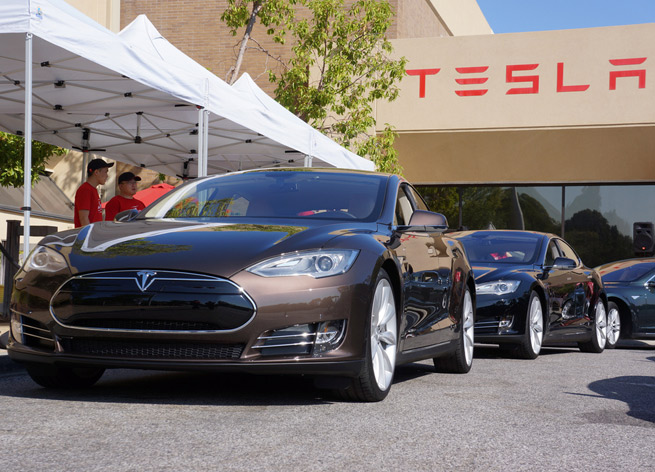Tesla is looking for a new partner to produce electric-car batteries in addition to its current maker, Panasonic, and it may have found one.
Or not.
Reuters reports that Tesla’s talks with Samsung SDI — a division of Korean electronics giant Samsung Electronics — are getting more serious.
Spokespeople from both companies said nothing concrete had come out of the talks, thus far, but two sources reportedly close to the deal told Reuters that Tesla and Samsung were nearing a final agreement.
One source said that negotiations were “90 percent complete,” and that the main roadblock has been Samsung SDI’s insistence that Tesla also buy components such as touch screens from its sister divisions.
Another source said Tesla Motors had already finished testing Samsung battery technology for future car applications. Samsung batteries would reportedly be used on the 2015 Tesla Model X crossover.
However, a third source contradicted the reports, saying the two companies were nowhere near a deal.
This individual, also reportedly close to the discussions, said Samsung’s lithium-ion cells were not competitive with those of Panasonic — Tesla’s current supplier (and also an investor in Tesla).
The source described the assertion that Tesla and Samsung are nearing an agreement as “not accurate.”
Why does Tesla need a second battery supplier?
The company is on pace to sell 21,000 or more Model S luxury sedans this year, and each uses a much larger battery pack than is typical for electric cars: either 60 kilowatt-hours or 85 kWh.
The Nissan Leaf, the best-selling electric car in history, uses a 24-kilowatt-hour lithium-ion battery pack. The smallest Model S battery pack is 60 kWh, and less than 30 percent of buyers opt for that.
At the rate it’s going, Tesla could double global demand for the small-format “18650” battery cells it uses in its cars.
Because of the nature of the battery cell industry, it’s unclear how much Model S battery packs are currently costing Tesla.
Still, the company is widely accepted in the industry to have among the lowest cost-per-kWh of all electric-car makers.
This story originally appeared on Green Car Reports. Copyright 2013


